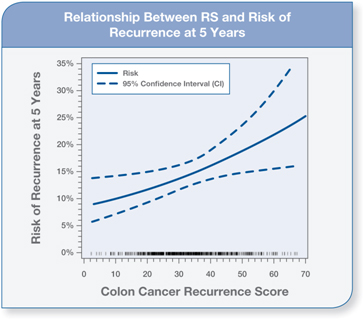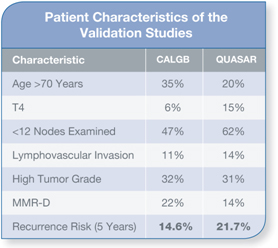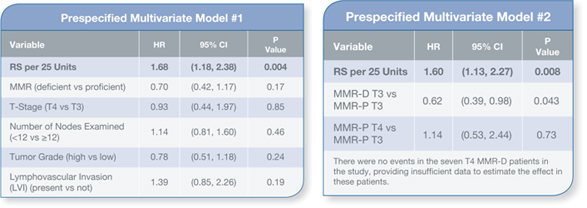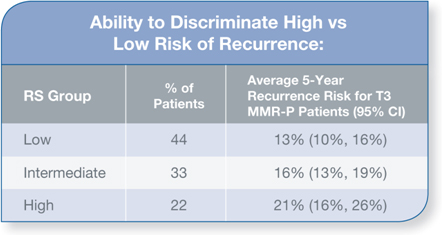 |
|
| ASCO 2011 Abstract on CALGB 9581 |
 |
Validation of a 12-gene colon cancer recurrence score (RS) in patients (pts) with stage II colon cancer (CC)
from CALGB 9581.
Author(s): A. P. Venook, D. Niedzwiecki, M. Lopatin, M. Lee, P. N. Friedman, W. Frankel, K. Clark-Langone, C. Yoshizawa, C. Millward, S. Shak, R. M. Goldberg, N. N. Mahmoud, R. L. Schilsky, M. M. Bertagnolli, Cancer and Leukemia Group B; University of California, San Francisco, San Francisco, CA; Duke University, Durham, NC; Genomic Health, Redwood City, CA; Cancer and Leukemia Group B, Chicago, IL; The Ohio State University, Columbus, OH; University of North Carolina at Chapel Hill, Chapel Hill, NC; University of Pennsylvania, Philadelphia, PA; The University of Chicago, Chicago, IL; Brigham and Women's Hospital, Boston, MA.
|
 |
| Background: |
 |
| The 12-gene RS (Genomic Health, Inc.) has been shown to predict risk of recurrence in stage II colon cancer (CC) pts in QUASAR. We conducted a validation study in tumor specimens from pts enrolled in CALGB 9581, which found no difference for edrecolomab (MoAb 17-1A) v. observation in 1672 pts with, on average, low risk stage II CC (14% 5-yr recurrence.) |
 |
| Methods: |
 |
| Cohort sampling included all pts with available tissue and recurrence and random pts w/o recurrence (3:1 ratio). Gene expression was analyzed by RT-PCR using FFPE from primary tumor. Mismatch repair (MMR) protein status (D= Deficient; I= Intact) was assessed by IHC for MLH1 and MSH2. Primary aim: prognostic value of continuous RS alone and in presence of MMR and traditional clinical/pathologic prognostic variables. A weighted Cox proportional hazards model was used to test the association between RS and recurrence-free interval (RFI) based on a Wald-type test statistic constructed using a weighted partial likelihood estimate and robust variance estimate. |
 |
| Results: |
 |
| Tumor was available for 1361/1672 (81%) pts. RT-PCR was successful in 690 (162 recurrences) of 736 pts (21% MMR-D, 35% > 70 yrs old, 47% < 12 nodes.) The continuous RS was significantly associated with RFI in univariate analysis (hazard ratio (HR)/ 25 units, 1.52; 95% CI, 1.09-2.12; p=0.01). MMR-D was also associated with RFI (HR, 0.62; 95%CI, 0.39-0.99; p=0.04); # nodes examined and lymphovascular invasion (LVI) were borderline significant (both p=0.06). In a pre-specified multivariate analysis w/ MMR, T-stage, nodes examined, grade, and LVI, RS was the only significant predictor of recurrence (HR/25 units=1.68, 95%CI 1.18-2.38; p=0.004). Recurrence risk at 5 yrs increased as RS increased and among subgroups defined by T-stage and MMR. In pts with T3, MMR-I tumors (n=488) pre-specified low (44% of pts RS < 29), intermediate (33%), and high (22% w/ RS > 39) RS groups had average 5-yr recurrence risks of 13%, 16%, and 21%, respectively. |
 |
| Conclusions: |
 |
| In 9581, RS improves the ability to discriminate higher from lower recurrence risk stage II CC pts beyond known prognostic factors, particularly in T3, MMR-I pts where traditional factors like grade and LVI were not prognostic. |
 |
| A PDF version of the CALGB 9581 poster is available here. |
 |
| CALGB 9581 Summary |
 |
| CALGB 9581: Second Successful Prospectively-Designed Validation Study: |
 |
- Confirms the performance of the Oncotype DX Colon Cancer Assay, previously validated in QUASAR as a predictor of recurrence risk in stage II colon cancer
- In CALGB 9581, a phase III prospectively-designed US cooperative group clinical trial, the continuous 12-gene RS was significantly associated with the risk of recurrence, providing value beyond conventional markers
|
 |
 |
 |
| CALGB 9581: A Unique Opportunity to Test in Low/Standard Risk Stage II Colon Cancer |
 |
- Sampling design with 690 evaluable patients, including 162 recurrence events, representative of 1672 stage II colon cancer patients from CALGB 9581
- Age and nodal sampling reflective of contemporary clinical practice
- Low/standard recurrence risk population; excluded patients with pT4b stage, perforation, obstruction, positive margins
- A population where risk discrimination is challenging with conventional clinical and pathologic factors
|
 |
 |
 |
CALGB 9581: RS Predicts Risk of Recurrence Beyond Traditional Clinical and Pathologic Covariates |
 |
 |
 |
| CALGB 9581: Improving the Ability to Discriminate High vs. Low risk of Recurrence in Standard Risk Stage II Colon Cancer |
 |
- For standard risk patients with T3, N0, MMR-P tumors, a high Recurrence Score can reveal an underlying biology indicative of more aggressive disease for which adjuvant therapy may be more appropriate
- The Oncotype DX Colon Cancer Assay identified 22% of patients with average risk of recurrence at 5 years above 20%, thus improving the ability to discriminate high from low recurrence risk stage II colon cancer patients beyond known prognostic factors
|
 |
 |
 |
| A PDF summary of the CALGB 9581 study is available here. |
 |
| To listen to Dr. Steve Shak review the ASCO 2011 data on the CALGB 9581 study, please click here. |
 |
| To download the slides from the post ASCO review, please click here. |
|




